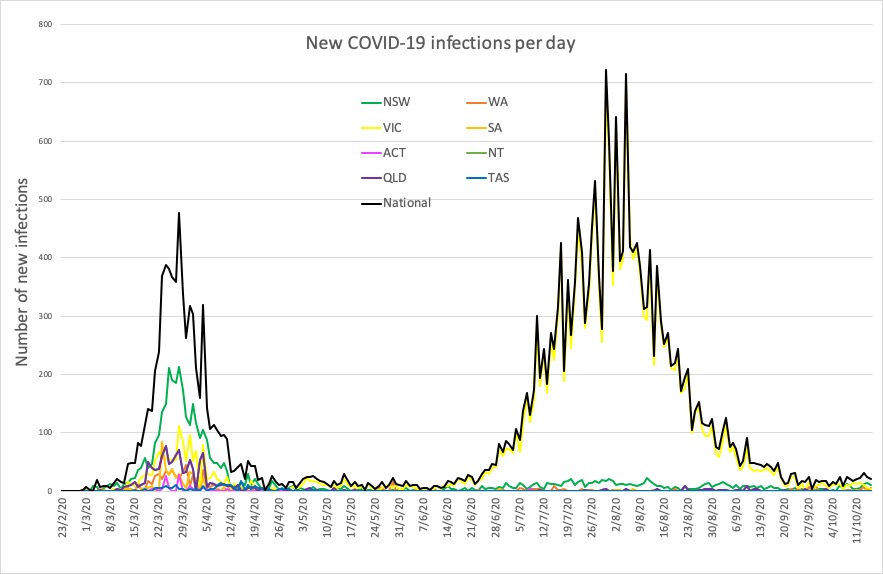Interim results from the WHO SOLIDARITY trial have found no mortality benefits from remdesivir, hydroxychloroquine, lopinavir + ritonavir, or interferon-beta1a.
Welcome to The Medical Republic’s COVID Catch-Up.
It’s the day’s COVID-19 news in one convenient post. Email bianca@biancanogrady.com with any tips, comments or feedback.
16 October
- No mortality benefit from four different COVID-19 drugs, according to WHO study.
- Women more likely to take COVID-19 seriously and comply with restrictions.
- Review explores phenomenon of ‘long COVID‘.
- Ice-hockey game infects most of the players with COVID-19.
- Latest confirmed COVID-19 infection numbers from around Australia.
- Disappointing news on the COVID-19 pharmacotherapy front: interim results from the WHO Solidarity trial have found no mortality benefits from remdesivir, hydroxychloroquine, lopinavir + ritonavir, or interferon-beta1a.
The study, which was published on the non-peer-reviewed preprint server MedRxiv, involved 11,266 adults hospitalised with COVID-19 in 405 hospitals across 30 countries. Participants were randomised to whichever of the drugs were available in their hospital, and nearly 4100 received no study drug.
The results found none of the drugs were associated with a lower risk of in-hospital mortality, regardless of age, sex, disease severity or corticosteroid use. Neither did they have any significant effect on the risk of ventilation in hospital.
“The unpromising overall findings from the regimens tested suffice to refute early hopes, based on smaller or non-randomized studies, that any will substantially reduce inpatient mortality, initiation of ventilation or hospitalisation duration,” they wrote. - A survey of more than 21,000 people across eight countries has revealed that women are more likely than men to take the health threat of the pandemic seriously and to comply with public health requirements such as mask-wearing and social distancing.
According to a paper published in PNAS, 59% of female respondents in the first wave of the survey – which involved more than 10,000 respondents – considered COVID-19 to be a very serious health problem, compared to 48.7% of men.
Women were also more likely than men to agree with restrictions designed to reduce transmission of the virus, and were more likely to comply with them.
The authors also saw significant variations across countries in this measure: agreement with restrictions ranged from below 40% in the United States to nearly 65% in New Zealand in March.
The differences between men and woman, and the level of concern overall, diminished in the second wave of the survey in April, but the difference between the genders remained significant.
Researchers suggested that these differences in attitudes and behaviours could be contributing to the gender difference in mortality rates from the virus. They also noted that female-led countries, such as Germany and New Zealand, also appear to have responded better to the pandemic compared to male-led countries.
“Because changes in behaviour, from reduced mobility to wearing masks, might have to be accepted as the “new normal,” at least for some time, differential public messages by gender may be required to increase compliance among men,” they wrote. - ‘Long COVID’ – the popular term coined to describe ongoing symptoms experienced by those who have recovered from COVID-19 – may represent a number of different syndromes, say the authors of a review from the UK’s National Institute of Health Research.
The review attempts to summarise the current understanding of and evidence for chronic COVID-19, while recognising that there is so far no consensus on diagnostic criteria for such a condition.
“Around the world, people with experience of living with ongoing effects of Covid19 are collating the range of experience and sharing their coping strategies, but as yet there is no formal diagnostic term for these ongoing effects, nor services to support them,” the authors wrote.
While the condition shares some commonalities with post-viral syndrome, the review group said it was too early to conclude that this represents all long-haul COVID.
“Indeed there is a possibility that the symptoms described may be due to a number of different syndromes (e.g. Post-Intensive Care syndrome, Post-Viral Fatigue syndrome and Long-Term Covid syndrome),” they wrote.
The review includes testimonies from patients, which give some sense of the frustration experienced by those who have persistent symptoms, such as sore throat, fatigue, ‘brain fog’, fever and cough. - An ice-hockey game in Florida has resulted in 14 of the 22 players, and one ice rink staffer, contracting COVID-19.
A study published in Morbidity and Mortality Weekly Report details how a single infected player – who began showing symptoms and was tested a day after the game – led to eight of his own team, five of the opposing team and one staff developing symptoms. Thirteen were tested and found to be infected, but two did not get tested.
The study’s authors commented that ice hockey is a very physical game, and while players wear hockey-specific face protection during the match, they did not wear face masks either during the match or in the locker rooms.
“The high proportion of infections that occurred in this outbreak provides evidence for SARS-CoV-2 transmission during an indoor sporting activity where intense physical activity is occurring,” they wrote. - Here are the latest confirmed COVID-19 infection figures from around Australia, to 9pm Thursday:
National – 27,362, with 904 deaths
ACT – 113 (0)
NSW – 4321 (11)
NT – 33 (0)
QLD – 1162 (1)
SA – 479 (0)
TAS – 230 (0)
VIC – 20,315 (6)
WA – 709 (5)



